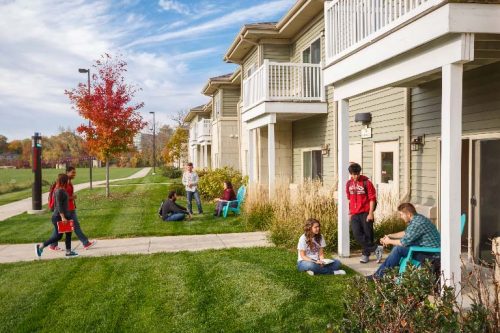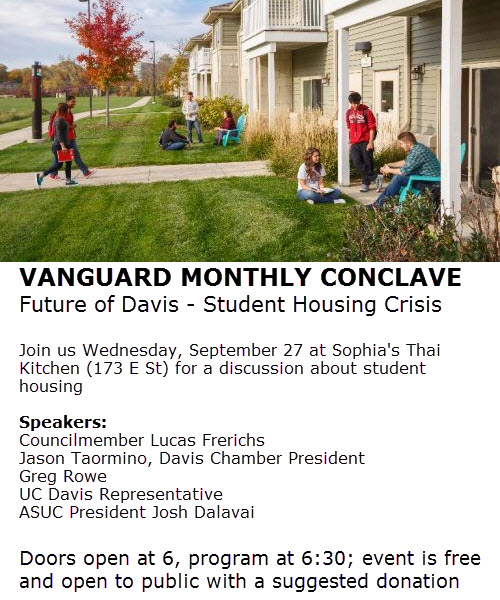
Several bills could have direct impact on Davis policies
The California legislature today passed a package of 15 consequential measures aimed at tackling the state’s housing crisis. The problem, which has gotten a lot of recent attention, has made California home to 21 of the 30 most expensive housing markets in the nation.
At a time when homeownership in California is at its lowest point since the 1940’s, the state Senate is moving policies to fund new development, streamline approval processes, strengthen existing laws, and create more local accountability to build new housing and increase homeownership across the Golden State.
Over the next decade, California must produce an estimated 1.8 million new units of housing in order to meet the demands of projected population and household growth. Focusing on the most vulnerable, like returning veterans and the homeless, Senate Democrats have proposed landmark measures to help those with the fewest options when it comes to housing.
Senator Bill Dodd (D-Napa) issued the following statement today regarding the Legislature’s passage of a package of bills aimed at addressing the state’s housing crisis: “Housing is a critical issue across California, and our region is one of the hardest hit. Rental vacancies in many of our communities are virtually nonexistent. Nearly one in three California renters pay more than half of their income toward rent, and homeownership is at the lowest rate since the 1940s. This package takes a multipronged approach to provide greater housing opportunity and security for all Californians. Through thoughtful investment, establishment of a continuous funding source, and streamlining construction, we will see meaningful progress. We did not get into this backlog overnight, and all levels of government need to continue advancing forward-thinking housing policy.”
Senator Dodd co-authored SB 2 and SB 3.
“The state Legislature won’t sit on the sidelines as California’s biggest crisis worsens day by day,” said Senator Toni Atkins (D-San Diego). “This package of bills — including my bill SB 2, which creates a badly needed permanent source of funding for affordable housing – will deliver relief to many residents who are struggling under the weight of housing instability, bring people experiencing homelessness in off the streets, and spur production of homes for people of all income levels in communities  throughout the state.”
throughout the state.”
“Senate Bill 3’s proposed $4 billion bond measure can serve as the catalyst to kick start the affordable housing construction our state needs. SB 3 working together with the Senate’s comprehensive housing package will provide a giant boost to our communities and regional economies,” said Senator Jim Beall (D-San Jose).
“The bills combined will produce over 70,000 new affordable housing units and create nearly 137,000 jobs. California’s hard-working families, millennials, seniors and vets will greatly benefit from this influx of new homes and apartments. Now is the time to get these housing bills passed – California needs them!’’
“This legislative package is a significant step forward in addressing California’s housing shortage,” said Senator Scott Wiener (D-San Francisco), author of SB 35. “The package doesn’t solve our housing problems entirely – that will take years of sustained focus and work – but it’s a very healthy down payment that should make us proud.
“California’s high housing costs are strangling our state’s economy and environment, undermining our health and quality of life. We’re past the point where communities can choose whether to create housing or whether to opt out.
“All communities need to participate in creating the housing we so desperately need. SB 35 holds local communities accountable by streamlining housing approvals in cities that aren’t meeting their state-mandated housing goals. We also need funding to create housing for our low-income residents, and I’m proud to co-author SB 2 with Senator Atkins and SB 3 with Senator Beall.”
Senator Richard D. Roth (D-Riverside), author of SB 540, said, “Access to housing is a basic human need, yet California is home to one of the most expensive housing markets in the nation, and many Californians are unable to afford or rent a home. That’s why I am proud to author Senate Bill 540, a commonsense measure which will incentivize and streamline housing construction to  help solve our state’s dire housing shortage.”
help solve our state’s dire housing shortage.”
Also among the bills were Senate Bill 166 and Senate Bill SB 167, authored by Senator Nancy Skinner (D-Berkeley). Senate Bill 166 strengthens California’s No Net Loss zoning law and Senate Bill 167 strengthens the Housing Accountability Act (HAA).
“Once a community has completed its planning and zoning process, housing proposals that play by the rules deserve to get a green light,” stated Senator Skinner. “And with the current supply crisis, local governments need to make sure that housing gets built on the sites identified for housing.”
Senate Bill 166 strengthens the No Net Loss zoning law by requiring local governments to immediately identify a replacement site if a project that differs from the housing category originally designated is approved. Additionally, SB 166 requires that the replacement site must meet the specific housing affordability level that was lost.
To help ensure that housing proposals which meet zoning and land use requirements aren’t thwarted, Senate Bill 167 adds teeth to the state’s Housing Accountability Act (HAA). Specifically, SB 167 increases the burden of proof that a local agency has to meet to deny a project, awards damages to plaintiffs if a local government is found to be acting in “bad faith,” and allows courts to leverage fines on cities that are not in compliance with the Housing Accountability Act.
“The goals of SB 167 and SB 166 are to remove barriers to housing construction and increase housing development across all affordability levels,” said Senator Skinner. “Strengthening existing law is central to meeting those goals and to combat our housing crisis.”
Senator Steve Bradford (D-Gardena) co-authored Assemblymember Richard Bloom’s (D-Santa Monica) AB 1505, which restores local governments’ ability to increase the supply of affordable housing units in cities across California.
In addition to these Senate bills, the legislature also sent nine Assembly bills to the Governor’s desk. AB 72, authored by Assemblymember Miguel Santiago (D-Los Angeles), gives the state the authority to enforce California housing element laws.
AB 73, authored by Assemblymember David Chiu (D-San Francisco), will streamline and incentivize housing production at the local level. AB 678, by Assemblymember Raul Bocanegra (D-San Fernando), strengthens housing accountability. AB 571, authored by Assemblymember Eduardo Garica (D-Coachella), will provide more low-income housing for farmworkers across the state.
AB 879, by Assemblymember Tim Grayson (D-Concord), requires local governments to collect information on the nongovernmental hurdles to housing development. AB 1397, by Assemblymember Evan Low (D-Campbell), strengthens local housing planning laws.
AB 1515, by Assemblymember Tom Daly (D-Anaheim), strengthens California’s housing accountability laws. AB 1521, authored by Assemblymember Bloom, will preserve existing affordable housing stock.
Learn more about the Senate’s plan to address California’s housing crisis here.
Learn more about the scale and impacts of California’s housing crisis here.







Did you purposely leave out illegal immigrants? Being that we’re well on our way to becoming a sanctuary state is the housing problem ever going to get solved when we will have illegal immigrants flowing into our state due to our policies?
Even if it is only legal immigration, the numbers will go up…
Hmmm . . . I’m gonna go way out on a limb here and guess: “Not as much”.
The language came out of the press release from various senators, I didn’t write this article and you’ll note it is not under my byline.
You talk about a future cluster f%$#, what could possibly go wrong with this?
I agree, Keith. I can envision a community fighting this, in the future. (Perhaps a wealthier “coastal” community/enclave which resists providing Affordable housing.)
On a larger scale, no one seems to want to address the “elephant in the room”. That is, what is the “goal”, regarding the ultimate population range of California? 40 million, now. Or, are we simply going to continue to say that there’s a “demand”, and never address that question. (Unfortunately, I think I know the answer at this point, at least.)
There’s lots of space in Wyoming, Ron.
Unless you have a magic wand, or a nuclear device, don’t see how one can expect that the world’s, this country’s and this state’s population can be “frozen”… no matter how much it is discussed…
Howard: Maybe so, but that doesn’t mean that the state has to continually “accommodate” it.
Regarding “Wyoming”, anyone can live there, as well. There’s no reason that California has to continuously “meet” market demand.
Interestingly enough, some of the “nice” areas in Wyoming are quite expensive (e.g., Jackson Hole). One reason is that Rockefeller “secretly” purchased a lot of the land around Jackson Hole, and gave it to the government to add to Grand Teton National Park. (That effort was bitterly opposed by some of the locals, and some in government.)
Does that mean that some “can’t” live in Jackson Hole? (Maybe so, on a practical level.)
https://en.wikipedia.org/wiki/Grand_Teton_National_Park
Ok… new term, NIMS (not in my state), or we can go with NIMC, or NIMW… got it…
Or we can not accommodate growth and let ‘natural selection’ forces work…
Howard: I wouldn’t put it that way, and that description is way-overboard.
In any case, what’s your “alternative”?
As a society, to ‘deal with it’… as we have been for the last couple of hundred years, in one way or another… we adapt…
Not a case of “if we build it, they will come”, but rather “they are here and have needs”…
Interesting that you used the example of the “last couple of hundred years” (a time in which the population exploded, to say the least). Anyone with a lick of sense can see that can’t continue on a finite planet.
By “adapt”, I guess you mean further reduce habitat for wildlife/open space, create bigger traffic messes, further impact limited resources such as water supply, add more greenhouse gasses, etc. And, continue that pattern forevermore, until we all run up against “natural selection”. (At that point, “natural selection” might occur as a result of increasing conflicts related to your “plan”.)
That will “always” be the case, if this isn’t dealt with at some point. (In the meantime, being “here”, or in any particular location is not a “requirement”. And, I would argue that it’s bad planning to make that a goal for any particular community. Hence, my “Jackson Hole” example.)
I’ve never even visited Jackson Hole, but I sincerely appreciate what Rockefeller did.
Ron is correct, the housing problem will never go away in California as long as we have policies in place that welcomes illegal immigrants. We can use up tons of our precious farmland to build all the ugly cheap tract housing that developers love to build and we will still face a housing shortage 10 years from now because we’ll have let in many millions more of illegal immigrants.
This is what happens when you have liberals running the state.
Keith: Unchecked immigration is part of the problem. However, it’s never a subject that I’m comfortable with, as it is (too easily) thought of by some as based upon racism. (Even when that’s not accurate.)
I still consider myself a “liberal”, in most ways. However, I try to respect those with different views. (Even those who don’t agree, regarding growth/development.)
In general, you present “conservative” views in an effective and straightforward manner. (And, I imagine that you must feel rather unsupported in doing so, in Davis.)
Ron, I don’t care, I know it’s not PC to say but it’s a fact. Keep letting in illegal immigrants by the millions and the housing problem is never going away. Making CA a sanctuary state is only going to exacerbate the problem. I don’t want to hear any liberals ever complaining about how long it takes to drive anywhere in this state, their policies are only making it worse.
Keith: I suspect there’s a lot of truth in that. (Man, it makes me uncomfortable to even acknowledge it, though.)
Ron, there are many liberals who know this but are afraid to admit it because they don’t want to lose their liberal creds. They have to keep up their PC appearance to their friends.
See: Burning Man (Black Rock City)
https://en.wikipedia.org/wiki/Burning_Man#Timeline_of_the_event
We now have to rely on infectious disease to save us.
Or, North Korea…
Actually the infectious diseases might work better for Davis, given the past predilection not to have children in Davis vaccinated… argument was generally, why should my child have any risk of innoculation, because if everyone else does it, my kid is just as safe…
Drifting……………..
Good point… will have to follow your example, as I’ve never seen you do that…
Indeed, I took your lead Howard:
Actually, it was not my “drift”, but one I responded to (Jim H’s) … you initiated the other… but let’s not let ‘facts’ get in the way… that’s not fun… more fun to score ‘coup’… or try… you just failed… and added to the drift, as have I… have a good evening, and best to you and yours…
Drifting yet again……..
I’d argue this legislation has now upped the ante on the CASP
In your dreams, perhaps. However, I’m pretty sure that you’ll be continuing to argue this, going forward. And, once again, you’ll fail to compare Davis’ efforts with those of other communities (e.g., who perhaps aren’t even trying to meet Affordable housing requirements).
Look at SB 167
Really, I find the Vanguard to be primarily an enemy of those who favor slow growth.
I’m coming around to that way of thinking too Ron. I used to see the Vanguard as a slow growth ally but I feel the Vanguard has switched sides over the last few years.
I have my suspicions as to why.
Enemy is a strong word
Thanks, Keith. (And – I realize that probably means more coming from you, than from me.) Regardless, I think others are realizing this, as well.
David: The first thing that “popped up” regarding “enemy”: “a person who is actively opposed or hostile to someone or something.”
I don’t think the definition is an inaccurate description. However, it’s nothing personal. Just different vision/goals.
I’ve been reading the V since it first came out.
Things have changed here a lot in the last few years.
You would be right.
I doubt it.
(Another person in the real estate industry told me essentially the same thing. However, he believed that prices would actually fall somewhat, thereafter. Perhaps some “good news” for some, on the horizon.)
http://www.davisenterprise.com/local-news/limited-supply-constant-demand-davis-real-estate-market-remains-hot/
Particularly those who bought in @ $55/sf (1980), or even $100/sf (1994)… and if folk can wait for the next cycle, with little/no new residential, might dip from ~ $260/sf (2015), then rise to $300/sf on next cycle (resale… suspect the ‘new’ is higher).
IF we can keep a lid on supply! Economically (from a personal standpoint), we should definitely all be BANANAs! After all, it is all about us, who are already here, and already paid for our entrance fee! And we can clothe it as protecting prime ag, open space, traffic congestion/GHG, and the environment in general… and surely, it will make darn sure no “illegals” in Davis if we have the same attitude towards MF, particularly affordable housing…
I “see the ‘light'”…
Thank those who taught me to “see”…
Oh… forgot to point out that by refusing all new housing, to the extent of the new laws proposed, we can bring UCD to its knees, in humility and in ‘justice’… another benefit…
Seems like you (perhaps purposefully?) misunderstood the quote. However, I suspect that you are correct – in the long run. (The lows/highs are usually “higher”, with each respective cycle.) The “good” news is that prices don’t always rise (and sometimes fall). It appears that we’re heading into one of those “downward” (or at least “stable”) periods, soon.
Regarding increasing sales price over time, it is an “advantage” for those who purchased earlier. (I am not in a position to purchase the house I grew up in, for example. And, that’s due to the extreme rise in prices in that area. It has drastically changed, since I was born.) But, unless someone moves to an entirely cheaper location, it’s an unrealized advantage. Proposition 13 also helps ensure that people stay in place.
Unless they move out of state, as many are…
Or die, and leave it to their kids… then the kids can take advantage…
And your ‘childhood home’ reference is dissembling… I inherited mine… my parents loved me… bought for $10/sf in 1955, sold for $530/sf in 2002. Dad wanted me to sell it, so assets could also be passed to his grandkids… I could have ignored that, but didn’t… I also loved and respected my Dad…
I have to assume your parents did not leave you the family home… never occurred to me to move back to my ‘childhood home’… too damn small! 850 sf…
As a side note, the “Rich Dad” series of books provides an interesting perspective on wealth. In those books, the author notes that one’s home should generally not be considered an “investment”. I recall that the author notes that middle-class people often make that mistake. (Something to that effect.)
As another side note, how about asking developers to lower their prices (if that’s what you’re concerned about). How much do those cats make? (Especially the larger ones, such as those behind the Natomas development, for example.) I’m pretty sure we’re talking about some pretty wealthy people, there.
Regarding children inheriting property – yes, that’s true. (They can also “inherit” their parents’ low property taxes, if the property is kept.)
(The truly wealthy developers are generally not on the Vanguard, arguing with each other. Instead, they leave that to the “housing advocates” and friendly politicians, I suppose.) 🙂
Yeah, read the book… it (house/home) is shelter, and if the financial works out good as well, so much the better… do you consider your house as a prize investment at this point?
And to be clear, only children can lock in the assessed value… not other heirs, particularly if the property was placed in a trust… just to keep the facts straight…
As to developers… there are direct costs, including acquiring the land, going thru the entitlement processes, building the structure, and risk of anything going sideways at any point.
Just like any other investment, if there are higher risks, you expect higher profits… do you have any money invested in mutual funds in companies, and/or real estate? If yes, you are technically a developer… you profit from development… feel free to donate any and all of those proceeds to the City or your charity of choice… wouldn’t dream of you keeping those, as you seem ‘righteous’ about profits from development…
And feel free to donate any net proceeds from the eventual proceeds of the sale of your property… that would be consistent with your apparent stance…
Howard: YOU’RE the one complaining about high prices, right? I’m just suggesting that you’re barking up the wrong tree (and probably not even the right “forest”). It’s not “driving” my arguments for a stable population (and not just in Davis), nor is it driving my advocacy to have UCD assume responsibility for the demand it’s creating. (In fact, both of those “advocacy” positions would tend to keep housing prices in check.) Do you think I’d waste so much time on the Vanguard, if I didn’t really care about those issues?
I just found this (old) article, and haven’t reviewed it in-depth. But, I’d suggest speaking with one or two of these guys, if you’re serious about sharing wealth resulting from real estate speculation. (Lots more “bang for your buck”, here):
https://www.newsreview.com/sacramento/great-natomas-land-rush/content?oid=33979
I was not COMPLAINING about high prices (wrong again)… I was acknowledging them… and that they are a real problem for others… I’ve “got mine”, and even paid off my MR assessments and mortgage on current house from sale of our previous home, which we had used as a rental… and paid a big bit in taxes for that sale… will admit that we sold the rental for less than we could have (maybe 5-10%)… but, like you say, it was not just an investment, and the family we sold it to was stretched a bit beyond what they’d have to pay if it had gone MLS. They were neighbors with a young family, renting but wanting to buy. Semi-private sale, one realtor representing both parties.
Our choice (to get less than what we were advised we could get)… not the City’s, not the State’s, not yours, to extend what might be considered ‘charity’ by some… looks like you are into capitating what a developer or owner’s “profit” should be… rest assured if you tried to ‘guilt’ me into giving them a break, I would have been adamant in going for the max we could have gotten. I’m funny that way…
Somehow I seriously doubt that you or your heirs would make a similar choice… I may be wrong, but I’d give odds…
I take it you have no mutual funds in your portfolio that rely on ‘development’… you responded not to that…
Howard: Again, you’re making assumptions (about me, or what I said) that have no basis. (And, in this case, you’re also including my “heirs”.)
However, I can see why you’re so opposed to some of my comments, based upon what you believe about me.
Let’s just leave it at that. (Got to run for awhile, anyway.)
Can you? Are you clairvoyant? You misread my words (made no assumption, but did postulate), but suppose you can read my mind…
And yet, you still don’t indicate whether you benefit from development (or the lack thereof)… you have been very consistent in that.
And, I agree, let’s leave it at that.
I’m back, for the moment.
Yes, you are indeed “postulating”. Incorrectly.
To answer your question – yes, I’ve benefited “from” development (in that it’s provided a place for me to live), and from (relative) “lack of development” (compared to most towns where it runs amok). And yes, I’m glad that I purchased my house when I did. However, I’d probably still be alive (and perhaps “thriving” somewhere) even if I hadn’t done so. (Again, you seem fixated on these things, even though what I “advocate” for the most part would likely stabilize prices.)
My bad… thought the avg. price was $265/sf… the Emptyprize indicates $365/sf on low end…
Ron may point out that he couldn’t buy his childhood home… I couldn’t afford to buy the house I’ve been in for the past 23 years!!!!